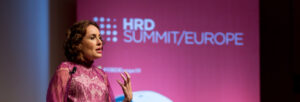Top talent trends 2018
- 4 Min Read
Mercer has released its annual research into talent trends sharing insights from senior business executives, HR leaders, and employees around the world. Three years into the study we can see some trends building year on year, such as a drive for agility and flexing the approach to talent acquisition; and others which are beginning to stand out, such as creating a digital employee experience. So where is the focus for 2018?
- Author: Jennifer Saunders
- Date published: Jun 7, 2018
- Categories

Based on their annual report, Mercer determined the key areas of focus are; purpose, flexibility and being digital from the inside out.
Focus on digitalisation
Managing the impact of automation and digitalisation on jobs and skills requirements is a key trend in 2018. One in three employees surveyed reported their roles and responsibilities have already changed due to digital technology, and this is expected to double in the next few years. Senior Executives responded that 20% of roles in their organisation will cease to exist in five years. Companies cannot thrive without taking advantage of the best and newest technology and what the research highlights is that the greater the march of technology and data, the more important human capability and judgement becomes. So digitalising the employee’s work experience becomes important in building a digital organisation.

Companies that are outwardly digital tend to have a digital employee experience,. i.e. if your employees have a digital experience, it is likely that your customers have too. Few (15%) organisations consider themselves ‘digital’ but 45% feel they are on the way to becoming a digital company (internally and externally) and 31% believe they are making great progress on transformation.
And what’s different about digital companies? Well 75% reported high scores for change agility; 87% have compelling and differentiated Employee Value Propositions (EVP), and 82% see HR as an advisor on human capital risk.
Agility – a priority that still alludes
Agility has been a priority for organisations for a few years. However, the ability to change and doing so at speed is emerging as a differentiating competency for companies. Most (93%) organisations last year were planning to redesign their organisation, this has increased to 96% in 2018 (according to executive respondents); reflecting a movement towards continual change. 52% of companies believe flattening structures will be the most critical change to make in the next two years. Despite these changes, only 18% of companies believe they are “change agile”. Whilst an increase of 4% from last year it is still a work in progress. Just two in five executives have transformation metrics on their scorecard.
However, what is improving is the perception of HR to support the change, with 59% of companies now saying HR is a key contributor in strategic planning and 67% of executives reporting that their respect for HR capabilities has grown.
Taking a platform approach to talent
Another continuing trend is around changing the nature of employment and in particular, companies looking at opportunities of taking a “platform approach” to talent, as we now do to order a taxi, takeaways and rent hotels. Senior Executives listed improving the ability to move jobs to people and people to jobs as an investment that would deliver the most impact. Having diverse talent sources which value access, not ownership means that internal employees form one part of the workforce and the role of partnerships, freelancers, crowdsourcing and even working with the competition is enhanced.
Changes in the EVP – focus on flexibility and purpose
Flexibility is becoming a very important part of the EVP with 51% of all employees wanting more flexible work options. 40% cite flexibility as the key thing that would help them thrive at work (up from 26% last year). Organisations have confidence that they offer flexibility (71% of Thriving organisation offer it), however in reality most are offering pockets of flexibility. 36% of flexible working requests last year were turned down, and just 3% of companies consider themselves industry leaders.
Another interesting change around the EVP is a need to focus on a higher sense of purpose to attract and retain talent. Thriving employees are now three times more likely to work for a company with a strong sense of purpose and ten times more likely to feel career empowered. People want meaningful careers and 39% of respondents report they are satisfied in their current job but plan to leave due to lack of career options. As a result employers need to offer careers that people crave, provide access to career movement, learning and opportunities for experimentation.
* You can download the full report here: https://www.mercer.com/our-thinking/career/global-talent-hr-trends.html




